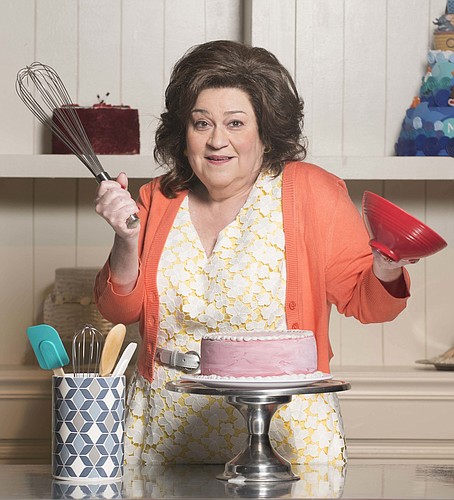- May 4, 2024
-
-
Loading

Loading

Cake, with its creamy frosting and sugary goodness, is a treat best served alongside joy and happiness.
Usually it’s shared between friends and families for birthdays or retirements or a simple midweek pick-me-up. Regardless of the occasion, it has a way of making bad days seem sweeter.
But what if cake divided people?
Well, now it has.
Bekah Brunstetter, a playwright and Emmy-award winning writer and producer for NBC’s “This is Us,” was reckoning with her difference in opinions from the majority of her conservative (and heavily Baptist) North Carolina hometown.
She wanted to write a play about how to have empathy for those with opposing views and how to figure out where they’re coming from. She also knew she wanted the protagonist to be conservative.
Enter “The Cake,” which Asolo Repertory Theatre is now performing through April 28.
The play introduces audiences to Jen, an engaged woman who wants her late mother’s best friend, Della, to make her wedding cake. Della is pleased to make the cake, until she realizes Jen is engaged to a woman. When Jen and her fiancé return to North Carolina, moral dilemmas arise.
Brunstetter joined a playwright group during summer 2015 where she worked on the piece. She also got engaged during that time, which tied in the complicated feelings that can arise when planning a wedding.
Between her engagement, knack for baking, upbringing and what she says is her inability to not write anything that isn’t personal, she had all the ingredients for “The Cake.”
“Personally, I love baking,” Brunstetter says. “It’s the only thing I do that’s purely recreational ... It’s very soothing to me, and it’s also a very universal place, so I thought it was the perfect set piece for exploring values that divide people.”
Brunstetter never intended for “The Cake” to be so timely. She calls it a “happy accident.”
When rehearsals began for the play’s first production in 2017, the U.S. Supreme Court announced it would hear the Masterpiece Cakeshop case. By that time, Brunstetter had been working on the play for two years.
Between the Supreme Court case and Donald Trump being elected president, the play gained more attention, she says.
Not all of it was positive, but Brunstetter gets it. She understands why some reviewers, particularly those in New York, don’t want to feel empathy for Della.
“It’s my luxury to live in the world as a straight, white woman,” she says. “(This play) hasn’t been my lived experience. I’m not a person of color. I’m not gay. If the play is triggering people, and if they are not wanting to feel for her, then I have to understand that.”
Although her sexual orientation is different than the character of Jen, Brunstetter says she relates most to her. She couldn’t help but wonder if her parents would think differently if she weren’t straight. She says writing the Jen character was a dramatic exercise of imagining that alternative scenario.
“She definitely embodies this split-in-half feeling that I’ve always had since I left the state,” she says.
But after her parents saw the play, Brunstetter was reminded why she wrote it in the first place.
“It was just honestly the best night of my life as a playwright so far because they were so loving and supportive and felt like their point of view was respected, but also, they found themselves laughing and thinking and feeling engaged with it,” she says. “Their ability to love me even though I don’t agree with them is a big reason I wrote the play.”
Brunstetter says she hopes audiences walk away with more of an understanding of people with opposing views.
“I also hope they feel like every character in the play is lovable and worthy of respect and that they laugh and they have a nice night,” she says.